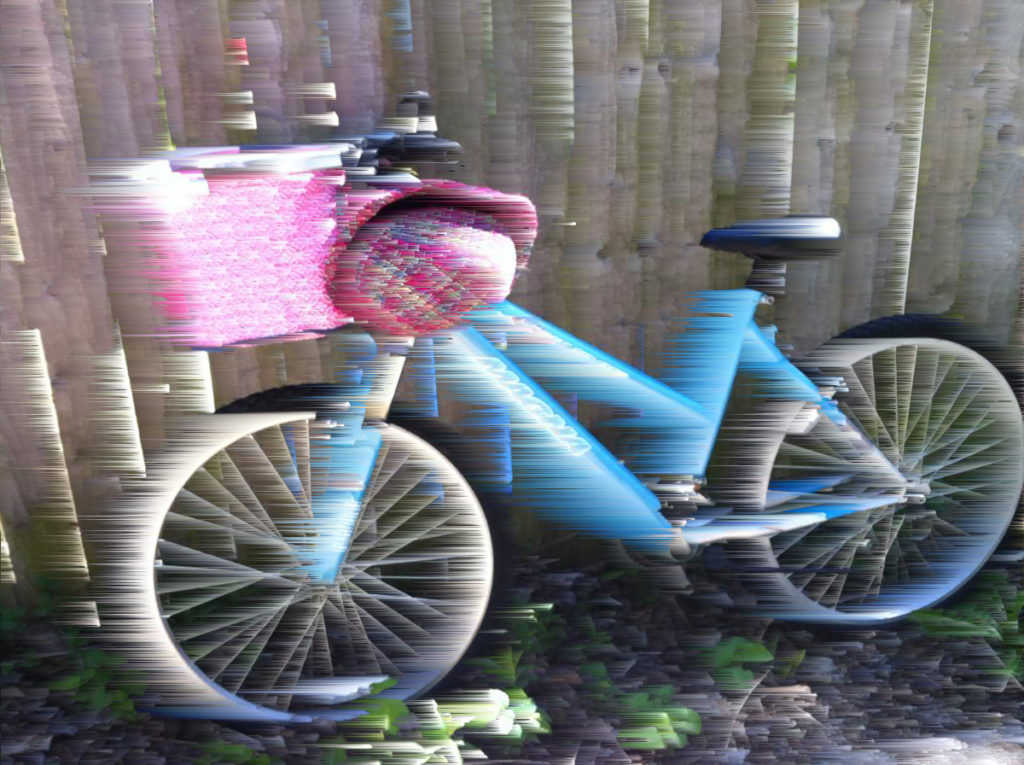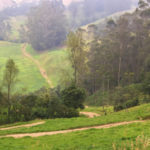 In 1989, when I was fifteen years old, I had a terrible bike accident. Following my friend and her father through a wide intersection in the final moments of our yellow light, I rode my bike directly into a car that began moving forward just as our light turned red. As I saw that the driver was speeding up and that I would almost certainly collide with her, I did what many people do, instinctively, when they’re frightened: I closed my eyes.
In 1989, when I was fifteen years old, I had a terrible bike accident. Following my friend and her father through a wide intersection in the final moments of our yellow light, I rode my bike directly into a car that began moving forward just as our light turned red. As I saw that the driver was speeding up and that I would almost certainly collide with her, I did what many people do, instinctively, when they’re frightened: I closed my eyes.
The last thing I remember from that crash was seeing that my front bike tire was about to hit the side of the moving car. The events that followed were a series of flashes: seeing my bike twenty feet away from where I lay on the street, the EMT’s face above me; answering the question of who our president was as the ambulance sped toward the hospital; my mother’s face in the emergency room. I had a concussion, stitches on my scalp, and a compression fracture in one of my vertebrae. The friend who had been behind me on the bike ride said she watched me collide with the car and fly high into the air, landing heavily on my back and the back of my head. It was the 80s; no one wore bike helmets.
I often think of this as I ride my current bicycle around town. I recall the crash from my childhood and even remember the aftermath in the hospital. My back still twinges from time to time, and hair never grew in again over the spot where I had stitches. Still, I love to ride my bike. I love the way a hot day turns cooler with the wind I create on two wheels. I love the freedom of choosing alleys instead of roads, of avoiding traffic, of parking anywhere I can safely lock my bike. I love my bright blue bicycle itself, and the quirky helmet that all my friends can identify from afar. I love the inner child who tugs at my shirt when I get on, proud to keep herself balanced on the pedals and thrilled to be moving faster than on foot but still using only the power of her own two legs.
In short, that bike accident — violent, frightening, memorable — has not ruined my love of bicycling. So, how can we know, as parents, which experiences will wreak havoc on a child’s future interactions and which will be unable to change what is fundamental?
It’s a question I ponder often as I watch my children navigate their world. My younger daughter, Sammi, lived through so much medical trauma it is a shock to me every single time she visits a doctor and does not panic. I think, if I were her, that I might suffer from at least some post-traumatic stress just from the smell of alcohol wipes. For whatever reason, she does not. She occasionally tells stories about her medical experiences, but she is often simply asking to be reassured that her memory is accurate.
“Did they take blood from me when I was asleep during my endoscopies?”
Yes, they did.
“Was I always asleep?”
Yes. They put you to sleep first before they did anything that could hurt you.
“Oh. Ok,” she’ll answer, and return to whatever she was doing. Part of me wonders whether she is simply filling in the pieces of what happened so that her frank, straightforward memories can be reinforced. When other, unrelated issues trouble her, I am always waiting for the thing that will trigger a final, tearful, relieving set of bigger questions she needs answered. So far, this hasn’t happened.
For me, though, the mere mention of someone’s surgery, broken bone, injection, or other medical procedure seems to make the ground beneath my feet wobbly. I can feel blood rushing away from my ankles, and my mind flashes through images of Sammi: pale, sick, wheezing, eyes wide, a tiny hand clutching my shirt in a hospital room eleven years ago, every image like a rapid and woozy slideshow. I do the exercise my friend Andrea taught me, feeling roots shoot through my body and out the bottoms of my feet, powering through the earth to ground me, plant me. This is not happening to you. She is safe.
What, then, is the thing that causes long-term trauma, and what ensures that we get back on the bicycle and ride again? In my sample of two, there is not enough data, but I can guess at some key differences:
My parents, for instance, never once told me that riding my bike wasn’t safe any more. They bought me a helmet and they fixed my broken bike, and the whole thing was blamed solidly on bad luck and a negligent driver.
In Sammi’s case, she may have lingering sadness, anger, and frustration over the years she spent in and out of the hospital, but perhaps she has by now internalized our reassurances that it is over, that she is better, and that the problem is solved. She is better. So, I imagine she is thinking, why worry about a pediatrician check-up?
All I can hope, as a parent, is that the tone that we set for our children will have some bearing on the monologues that play in their heads. I hope that when the street is calm, and the helmet fits well, my children will get on their bikes and go.
This is a Finish the Sentence Friday post, hosted by Kristi Campbell of Finding Ninee. The sentence is “The things I’ve forgotten…”






I so often think about childhood then versus now… how our parents had us roaming outdoors until the sun set, assuming all was fine with no cell-phones and no checking in. I rode my bike, skied, all of it with no helmet. And these days, I let my son scooter with a helmet and wonder if I should buy elbow and knee pads. It’s so different indeed and I’m SO GLAD you linked up with Finish the Sentence!!!
I think you have a huge idea here when you mention that your parents did not say it was no longer safe to ride your bike. (Too many negatives there – sorry.) So often we are left frozen and unable to move forward after any type of trauma. Suddenly, what we knew to be fun and safe and just plain OK can be terrifying. If we allow that feeling to take over, we change the course of our future and the way we see the world. Maybe sometimes forgetting is a good thing. Great post. Glad you’re still biking!